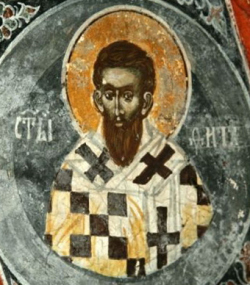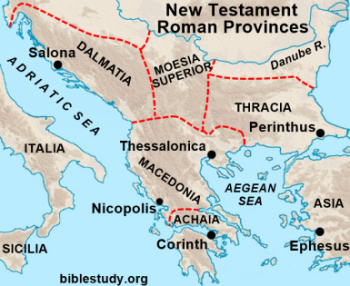Titus is mentioned, by name, 15 times in 14 King James New Testament verses. He is recorded the most in 2Corinthians (10 times) followed by Galatians and Titus (twice each) and 2Timothy (once).
Birth and Conversion
Unfortunately, the Bible is silent regarding when and where Titus was born. He was a gentile (Greek) who likely, at the time of his conversion, lived in Syrian Antioch.
The Apostle Paul's labeling of Titus as "a true son according to our common faith" (Titus 1:4, HBFV throughout) highly suggests the apostle was instrumental in his conversion. If this is the case, he may have been converted as early as 41 A.D. when the apostle taught in Syrian Antioch for one year (Acts 11:25 - 26).
Titus may, however, been converted during Paul's first missionary journey (Acts 13:4 - 52, 14:1 - 25), which ran from 44 to 46 A.D., or very shortly thereafter.
49 A.D.
The First Appearance
Titus first appearance, chronologically, in the Bible is in the summer of 49 A.D.

In 49 A.D. a group of former Jewish Pharisees, who had converted to Christianity, travel from Jerusalem to Syrian Antioch. When they arrive in the city they begin to teach that gentile (Greek) Christians must be circumcised to receive salvation.
Now certain men who had come down from Judea were teaching the brethren, saying, "Unless you are circumcised after the custom of Moses, you cannot be saved." (Acts 15:1).
After Paul and Barnabas attempt, in vain, to stop the above teaching, it is decided to travel to Jerusalem in order to finally settle this contentious issue (Acts 15:2). Titus, as well as other Christians in Syrian Antioch, accompany Paul and Barnabas on their journey (Galatians 2:1). The subsequent church gathering to decide the issue of circumcision is called the Jerusalem Conference.
Titus was almost certainly a bit uncomfortable in Jerusalem as he was one of the very few, if only, uncircumcised Christians in attendance at this historic meeting. Although there were some false teachers who wanted to force him to be circumcised, both he and Paul resisted.
(But indeed, Titus, who was with me (Paul), being a Greek, was not compelled to be circumcised.). Now this meeting (between Paul and church leaders) was private because of false brethren brought in secretly, who came in by stealth to spy out our freedom which we have in Christ Jesus, in order that they might bring us into bondage;
To whom we did not yield in subjection, not even for one hour, so that the truth of the gospel might continue with you (Galatians 2:3 - 5).
Paul's Third Missionary Journey
Summer 53 A.D. to 58 A.D.
Apostle Paul, in the late winter of 56 A.D., was residing in and evangelizing Ephesus. It was during this time that he wrote 1Corinthians. Although it is not directed stated in the Bible, Titus (and at least one other) who were in Ephesus at the time were highly likely the people who delivered Paul's first letter to Corinth.
"If we compare 2Corinthians 12:18 with 1Corinthians 16:11, 12, it is natural to infer that the bearers of the First Epistle (from Ephesus to Corinth) were Titus, and some brother, who is unnamed . . . " (Life and Epistles of St. Paul, pg. 363, footnote #2).
Paul stays in Ephesus until the summer of 57 A.D. which was after the Day of Pentecost (1Corinthians 16:8). He then leaves the city for Troas where he arranged to meet Titus to discuss the status of the Corinth church and the response to his corrective epistle. The apostle, disappointed in not finding him in Troas, leaves to visit churches in Macedonia (2Corinthians 2:13).
Arriving in Philippi, Paul finally meets up with Titus who informs him about the response to his first letter to Corinth (2Corinthians 7:6, 13 - 14). The apostle, in the autumn of 57 A.D., has him and Luke transcribe another epistle (2Corinthians) to the church (2Corinthians 13:14 subscription found in KJV and other Bibles). Titus, and others, are then directed to deliver this letter to the Corinthians (8:16 - 22) which also vouches for their integrity and faithfulness.
Whether any do enquire of Titus, he is my partner and fellowhelper concerning you: or our brethren be enquired of, they are the messengers of the churches, and the glory of Christ (2Corinthians 8:23, KJV).
The Book of Titus
63 A.D.
In 63 A.D. the Apostle Paul is acquitted of all the charges laid against him and freed from his prison in Rome. His first act of freedom is to briefly meet with Titus, on Crete, to ordain him the island's overseer. Paul then travels to Nicopolis in Macedonia where he intends to spend the winter. It is from Nicopolis that the writes the book of Titus.
All of those with me salute you. Salute those who love us in the faith. Grace be with all of you. Amen. To Titus, chosen to be first overseer of the Cretan church, written from Nicopolis of Macedonia (Titus 3:15).

There was almost certainly Christians on Crete before the arrival of Paul or Titus. Those from Crete were one of the many peoples who witnessed the amazing events on Pentecost in 30 A.D. (Acts 2:11). Those converted on Pentecost, and afterwards, no doubt spread the gospel message on the island.
For this cause I left you in Crete, so that you might set in order the things that needed to be done, and might ordain elders in every city, as I commanded you . . . (Titus 1:5).
What was lacking on Crete was the proper organization of the believers so that they could not only grow spiritually but also be able to better handle false teachers and heresies (see Titus 1:11, 13, 3:9 - 11). Paul charges Titus to organize the island's fellowships, which is why the letter focuses on the qualifications for church leaders as well as how believers should behave.
Paul's last request of Titus was that he travel to Nicopolis to meet with the apostle (Titus 3:12).
Paul's Last Mention
Spring 68 A.D.
Paul's last writing is dated to the spring of 68 A.D. when he is again a prisoner in Rome. His writing of 2Timothy, where he mentions Titus for the last time, occurs shortly before he would be martyred in May or June.
Be diligent (Timothy) to come to me quickly; For Demas has forsaken me, having loved this present age, and has gone to Thessalonica; Crescens, to Galatia; Titus, to Dalmatia (2Timothy 4:9 - 10).
Paul, sometime before his letter, had sent Titus from Rome to Dalmatia for unknown reasons. Dalmatia, also called Illyricum, was a Roman province located on the coast of the Adriatic Sea just north of Greece.
Continuing to Serve
After 68 A.D.
Titus, after leaving Dalmatia, likely returned to Crete to oversee the island's Christian fellowships. One Roman Catholic tradition states he died sometime after he turned ninety. The International Standard Bible Encyclopedia sums up his life as follows.
"Titus was one of Paul's very dear and trusted friends; and the fact that he was chosen by the apostle to act as his delegate to Corinth, to transact difficult and delicate work in the church there,
"and that he did this oftener than once, and did it thoroughly and successfully, shows that Titus was not merely a good but a most capable man, tactful and resourceful and skillful in the handling of men and of affairs."